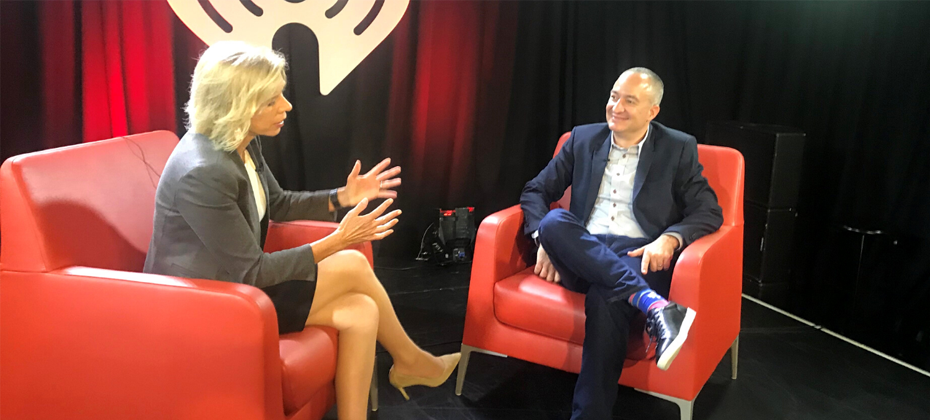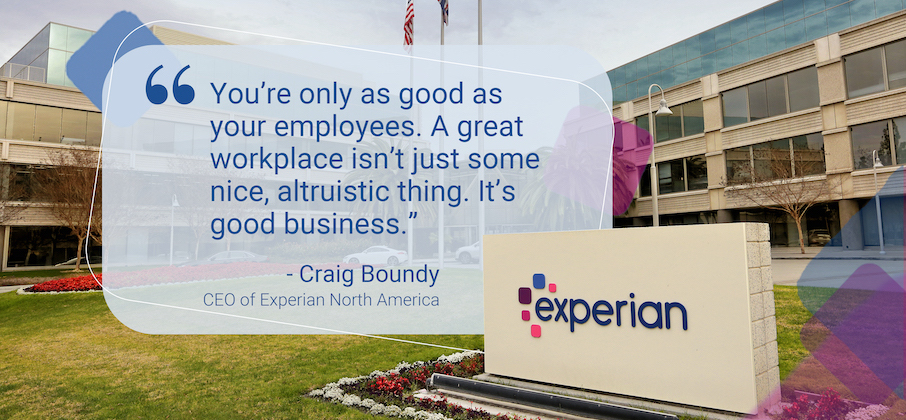Social Responsibility
Experian is deeply committed to making an important difference in each of the communities we operate and live all over the world. Through our relationships with nonprofit organizations, our dedication to consumer education and our encouragement of employee volunteerism, we are able to champion a number of important causes. Read about our latest corporate social responsibility news below:

Experian's game plan is focused on improving the financial health of consumers everywhere. As part of that journey, we recently went to Miami, Florida, ahead of the Big Game, with pro football legend and American Ninja Warrior host Akbar Gbajabiamila to discuss how Experian Boost is helping millions increase their credit scores. Gbajabiamila, author of “Everyone Can be a Ninja,” is passionate about helping people develop a financial game plan and he understands having a good credit score is a key component of good financial health. “There’s something I’m truly passionate about and it’s financial literacy. Credit scores are something so many people hear about, but they don’t know how to interact with them. Experian has a platform that allows people to personally impact their credit scores. You can literally take your everyday utility bills, add them into your Experian credit report and get credit for that,” said Gbajabiamila. The days leading up to the Big Game provided an exciting time for Gbajabiamila to share with consumers across the country about how Experian Boost is instantly improving credit scores and helping people take control of their credit. In fact, Akbar’s take on the important role credit scores play in financial health was enthusiastically received by many on-air hosts who echoed the need to speak about it more frequently. As Akbar shared, “Whether you’re a professional athlete or a fan of professional sports, it’s important that you pay attention to your credit report. And Experian Boost is the right step.” View highlights from our trip to Radio Row in the video below and learn more about Experian Boost by visiting www.Experian.com/BoostAmerica.

Craig Boundy, former Experian North America CEO, was a featured guest on iHeartRadio’s “CEOs You Should Know” program. During the interview, Boundy shares how Experian is helping consumers through the company’s Boost program and culture of innovation. In addition, he provides practical advice regarding how to be a more thoughtful leader with his “no bad news on Friday” rule.

At Experian we’re proud of our culture and commitment to honoring, practicing and celebrating the values of diversity and inclusion. Which is why we’re especially thrilled to be starting the year with some remarkable honors in recognition of our culture. Fortune and Great Place to Work have named Experian North America as one of the Best Workplaces for Diversity. Additionally, for the second year, Experian was awarded a perfect score in the Human Rights Campaign Foundation’s 2020 Corporate Equality Index. Each year, Fortune honors 100 companies in the U.S. that do the most to create inclusive cultures for women, people of color, LGBTQ people, employees who are Boomers or older, and people who have disabilities. The Human Rights Campaign Foundation’s 2020 Corporate Equality Index is a national benchmarking tool on corporate policies and practices pertinent to lesbian, gay, bisexual, transgender and queer employees, and Experian has earned the distinction of “Best Places to Work for LGBTQ Equality.” We’re extremely proud of these awards and the culture we’re building here at Experian. We truly believe in embracing inclusion and diversity and celebrating the differences among our employees. Through our Power of YOU inclusion and diversity commitment, we seek to create an environment where everyone is comfortable bringing their whole self to work, regardless of differences or backgrounds. As part of this effort, we have a variety of initiatives including eight Employee Resource Groups, which are sponsored by Experian and led by our employees. Additionally, everyone across the company is encouraged to play a key role in the creation of our latest innovative products. For example, this past year, we launched Experian Boost™, a free, first-of-its-kind, consumer-controlled tool that has the potential to impact an individual’s financial health for the better. Hundreds of employees from throughout the organization volunteered to personally evaluate Experian Boost because they believed in the product’s potential to help millions of people across the U.S. Throughout the past few years, Experian has received numerous accolades for our workplace and culture, including being named a Top Workplace in Orange County, Calif., by the Orange County Register for the seventh consecutive year, and being named one of the world’s most innovative companies by Forbes magazine for five years. Our ongoing goal is to further an inclusive and innovative workplace, which helps contribute to greater financial health and inclusion for everyone.

Through Experian’s technology and cutting-edge innovations, we’re helping consumers build their credit histories and access affordable, mainstream financial products. We are truly improving consumer’s financial lives in a meaningful way. But, with all the exciting innovations in technology, sometimes, it’s easy to forget the impact we can create in our everyday interactions with people. Let me give you an example. I recently traveled to Nashville, TN for a conference. Since I didn’t know my way around the area, I hired a driver to pick me up and take me to my hotel. As I was heading to the airport exit, I saw a woman holding a sign that read “Experian.” I introduced myself and we both got into the car and headed for the hotel. As we were driving, she asked, “So, do you really work at Experian?” “Here we go…” I thought as I responded, “Yes, I do.” She went on to tell me she was a Desert Storm veteran who faced some real financial hardships that tanked her credit score when she returned home from war. She saw a commercial for Experian Boost, our new tool that allows people to get credit for paying their telecom and utility bills on time. After trying the free tool, her score went up 11 points. This boost got her thinking about other ways she could improve her credit score. I spent the rest of our drive sharing some credit education including the importance improving her debt to income ratio, lowering utilization rates and making on time payments. As we pulled up to my hotel and I got out of the car, she asked if she could give me a hug. “Of course,” I said. I was touched and slightly surprised, to see how much of an effect I had on her. Only, I didn’t realize then just how much of an impact our conversation would truly make on her life. I recently had a chance to reconnect with Renee Preston. She told me about the dramatic changes she’s made since we met that are creating a lasting impact on her financial health. At the time Renee picked me up, she was $56,000 in debt and her credit score was 605. Just a few months after meeting her, Renee put some of the credit education tips I shared with her into practice. Since then, she’s lowered her debt by $36,000 and her credit score has improved by more than 60 points. While Renee knows she still has work to do, she is inspired to continue to improve her financial wellbeing. “I’ve been driving for more than 26 years. I’ve met all kinds of celebrities like Pink and Justin Timberlake. The fact that Alex took the time to talk to a little person like me, it really meant a lot. Since we met, I’ve taken a lot of steps to improve my credit and finances including getting a job with a much higher salary. I truly feel I owe all of these changes to Alex.” Renee Preston, Nashville, TN As a company, we are committed to helping people improve their financial lives. When we talk about being the consumer’s bureau, this is exactly what we mean. I’m so thankful I had the opportunity to meet Renee. I’m inspired to continue to find new ways to improve people’s financial health, both personally and as a leading member of Experian’s team.

As 2019 comes to a close, many people are outlining their goals for the new year. For some people, this means making plans to get healthier, reconnect with old friends or find a new job. For many, improving financial health comes in at the top of the list. In fact, we know saving more is a top resolution for 50% of people and one in three want to improve their credit scores in 2020. Saint Exupery once said, “a goal without a plan is just a wish” and he was right. When setting any goal, it’s important to put a plan in place. An essential first step toward creating an effective plan of action is getting a grasp of your current situation. The same is true for creating and achieving goals related to improving your financial health. Each year, we take a look at how Americans across the country are managing their credit to help people understand the purpose and impact of their credit scores. Our annual State of Credit report highlights average credit scores, debt levels and delinquency rates of people across America. In releasing this report, we hope to give people insight to help them make more informed decisions about credit use as we prepare to head into a new decade. Our latest report showed the average credit score hit an eight-year-high at 682. While people are taking on slightly more credit card, mortgage and nonmortgage debt year-over-year, delinquency rates are decreasing on average and utilization remains consistent at 30%, which means people are responsibly managing the debt they’re carrying. If your credit score is lower than you’d like, or if you’re looking for ways to maintain a positive credit history and improve your financial health, here are five ways you can better your financial standing in 2020: Check your credit report and credit score. Your credit report serves as your financial references. Take care of your credit report and you will take a big step toward better financial health. Credit scores play an important role in your financial journey. They translate the information in your credit report into a number reflecting the risk of doing business with you. Check your credit score at the same time you check your credit report. When you get credit score you should receive an explanation of what the score means and what from your credit report is most affecting it. This is an important step to gauge your current standing and to develop a plan to improve your credit report and scores. You can get a free credit report once every 12 months from Experian by visiting www.annualcreditreport.com or through the Experian app. Keep your utilization rate low. Your utilization rate, or balance-to-limit ratio, should never exceed 30 percent of your credit limit. At a maximum, your total credit card balances should not be more than 30 percent of your total credit card limits, and you don’t want any one card to have a balance of more than 30 percent of the limit of that one card. Both can hurt you. This doesn’t mean that you want to get your balances up to 30 percent and keep them there. The lower your utilization rate, the better. People with the best credit scores have utilization rates of less than 10 percent. As you head into 2020, focus on reducing your credit card balances and keeping your balances low. Use the tools available to you like Experian Boost. If you’re paying your cell phone, cable, satellite and utility payments on time, you can use our free tool, Experian Boost, to potentially increase your credit scores in the new year. We see scores improve for two out of three people who use Experian Boost with an average increase of more than 10 points. Plan ahead for major credit purchases. For many, the start of a new year can mean a new car, a new home and more. When preparing to make a major purchase, it is critical to demonstrate financial stability in the three to six months leading up to it. While it is important to optimize your scores before purchasing a house or a car, be careful not to make too many big moves right before your purchase. Closing accounts or applying for new credit could temporarily reduce your scores, so don’t open any new accounts during the months leading up to your purchase. Wait to close accounts or apply for new ones until after you have the keys to that car or house in hand. Pay on time, every time. Nothing will hurt your credit score more than missed or late payments. To maintain a positive credit history, make a plan to catch up on any missed payments. Enrolling in autopay can be a helpful way to stay on a payment schedule that works for you. Remember, credit can be a financial tool, but debt is a financial problem. Create your financial game plan for 2020 and use these tips to prepare for a financially healthy new year. If you need help along the way, visit the Ask Experian blog or tune into our weekly Credit Chat.

For the past seven years, Experian’s perennial presence on the Orange County Register’s list of Top Workplaces has been the cause for real celebration across our workforce, making this year more special with added honor of receiving the Award of Excellence for its corporate values. “We embrace strong corporate values and celebrate a diversity of ideas and backgrounds across the company. This diversity of thinking and the way we harness it at Experian helps to fuel our innovation and ultimately our ongoing success as a business,” said Craig Boundy, former chief executive officer of Experian North America. “This award is a credit to all the talented people who work here at Experian, bringing a strong drive to perform around a shared mission.” We celebrate our diversity through a range of fun, engaging and informative cultural events, including those supported by our Employee Resource Groups (ERGs). Employees can also join one of our many social clubs to share interests with colleagues, or volunteer with nonprofit organizations to give back to the communities of which Experian supports. Our culture of inclusion is truly something to celebrate and that’s because of every single person who makes up the Experian family and brings our brand to life every day. Experian’s mission is to create a better tomorrow through data, connecting consumers and businesses with more opportunities than ever before. This is supported by our culture of continuous innovation, from the way we work to the solutions we create. This commitment to innovation has helped us create a workplace where our teams across the world have a desire to help change the lives of millions for the better. The diversity of thinking across Experian, and the way in which we harness it, helps fuel our innovation and ultimately our ongoing success as a business. This makes our work relevant to our consumers and clients, adding more value in their own lives – creating a better tomorrow for them. As part of this, our culture works to connect employees to our brand, by involving them in the creation of new products and services. This has had a tremendous positive impact with employees providing valuable feedback and creating advocacy among team members. For example, when developing Experian Boost, which has helped millions of people raise their credit scores, we first beta-tested and shared the innovation internally and were able to garner valuable feedback and support from employees. As a result, we’ve seen tremendous success since the launch of Experian Boost earlier this year. Innovation and Business Success Our culture of diversity and inclusion has enabled Experian to grow and evolve while remaining at the forefront of innovation. For more than 40 years, Orange County has been the heart of our North America operations. We’ve remained focused on developing a culture that achieves and sustains higher performance while giving back to the community, and we’ve strengthened the business across every front. As a result, we continue to have a positive impact on consumers, businesses and the economy. We do this with our products, technology, and innovations -- from finding breakthroughs around better utilizing data, to identifying ways we can make access to credit faster and simpler for millions around the world. We’re very proud to be named a Top Workplace by the Orange County Register for our positive workplace culture, which attracts and retains top talent in Orange County, as well as our other locations across North America.

For many of us, the holidays are an exciting time filled with family, friends and a flurry of gift giving and receiving. Unfortunately, this time of year can also put a strain on finances and your financial health. In fact, we see many people start a new holiday season while they’re still working to pay off debt from the year before. Each year, our holiday spending survey takes a look at how people are feeling about holiday spending, how much they plan to spend and their financial goals for the new year. We found shoppers plan to spend 75% more this year on holiday spending than in 2018 with an average of $1,649, and 63% agree holiday expenses affect their finances negatively. We also found 38% of the people we spoke to are feeling stressed as the holiday season approaches. Getting a spending game plan in order now can help protect your financial health and keep your holidays merry and bright. Here are three ways to stay financially fit this holiday season and beyond: Create your holiday spending plan. Setting a budget is an important first step to ensure you’re not spending more than you can afford, but your holiday spending plan should include more than that. Think about who you need to shop for, where you’re going to shop and when you’re going to shop. Our survey showed the lure of a good deal can be hard for some to resist. In fact, one in five Americans said they would risk becoming a victim of identity theft for a good deal. Having a plan in place can help you avoid risky spending behavior while scrambling for last minute gifts. So, make that list and check it twice. Use credit as a financial tool. All year and especially around the holidays, I like to remind people that credit can be a financial tool, while debt is a financial problem. We know that about 44% of people plan to use credit to pay for gifts, and it’s important to do so responsibly. After all, the bills always arrive in January. If you’re going to use credit to pay for gifts, make sure you have a plan for paying your balances off to avoid missing payments and increasing your utilization rate – two critical factors that can have a negative impact on credit scores. Additionally, we found one in four shoppers plan to open a new credit card this season. Opening one or two cards to take advantage of in-store discounts or cash back offers can be a useful way to save money during the holidays, but don’t overdo it. If you take advantage of too many rewards offers, you may find you’ve saved yourself right into debt. Prepare your credit for holiday shopping and the new year. Getting your credit ready for the holiday season and the new year should be part of your holiday spending plan. That way, if you do plan to apply for new credit this shopping season or in 2020, your credit is ready to work for you. Get a copy of your credit report to ensure there are no surprises and catch up an any missed or late payments. This is also the first holiday season you can use free tools like Experian Boost to improve your credit scores if you’re paying your telecom and utility payments on time. We see scores improve for two out of three users with an average boost of more than 10 points. If you have a limited credit history or a thin credit file, you may see an even bigger boost to your credit score. We know almost have of those we spoke to for our survey will try to improve their credit score before the start of the new decade and Experian Boost is proving to be a valuable tool for consumers looking to do just that. There's often the temptation to overspend, but the best gift you can give yourself is being financially smart. My hope is these tips can help boost your holiday cheer while preparing you for a financially healthy new year. Happy holidays.

Building a credit history takes time. Establishing a credit history early in life can help ensure you have access to affordable credit when you need it. The problem is that people tend to learn about credit and finances through trial and error. This is unfortunate because recovering from financial mistakes takes time, too. In fact, it could take years to rebound from one financial misstep. This trend is especially common for young adults who are just beginning to get their financial feet wet, and it’s one of the many reasons credit education and improving the financial health of consumers of all ages is core to our mission at Experian. As Director of Consumer Education and Advocacy, I get the opportunity to talk to a variety of students and young adults across the country on a regular basis. Millennials and Gen Z are often labeled slackers, but I don’t believe that for an instant. They experienced the financial crisis firsthand in their early years, and they really don’t want to repeat what their parents went through. Can you blame them, really? One thing we know for certain about young adults is they are very interested in learning as much as they can about money, finance and credit, and it’s our goal to be an educational resource to them. As the saying goes, you don’t know what you don’t know. We have a chance to give younger generations the information and tools to know more than previous generations did at their ages. Here are some of my favorite tried and true tips to help set young adults up for credit success: Start small and grow slowly. A secured account with a small credit limit can establish your credit history and help you start saving at the same time. Good credit and strong savings habits go hand-in-hand. You don't need a credit card with a high limit to have good credit. Use the credit you have wisely. Good credit scores are not about having a lot of credit, but rather about how you use the credit you have available. Make a small purchase each month and pay it in full. That will show you can use credit well without taking on debt. Use your cell phone to improve your credit. With Experian Boost, you can add positive telecom and utility payments to your credit history and possibly boost your credit score. In the past, failing to pay your utility or cell phone bills could hurt your credit, but paying on time didn't help. With Experian Boost, that's changed. Use technology to make managing your credit automatic. Millennials and Gen Zers are the most technologically savvy generations in our history. Use technology, such as online banking apps and credit management tools like the Experian app, to automate savings and payments, to alert you to potential fraud and to track your progress as you build your credit history. We know helping people better understand and access credit is a team effort, and we work closely with our advocacy networks to increase our impact. We recently joined the American Bankers Association to provide young adults with financial education. Leading up to Get Smart About Credit Day, we hosted a Facebook Live with Jeni Pastier, Director of Financial Education Programs for the American Bankers Association to address credit topics young adults typically don’t understand or know about at all. You can watch the full video here and find additional articles to get smarter about credit on the Ask Experian blog.

Today (Nov. 11) Americans celebrate Veterans Day to honor all of the men and women who have served our country in uniform and to thank those who are currently serving around the world. We also take time to welcome a new generation of veterans home from war. We remember our Gold Star families who have endured the loss of a family member making the ultimate sacrifice in service to their country. More than 25 million veterans are now home in America. They are our friends, our families, and our loved ones. Far too many have endured the shock and pain of a combat deployment, some have become disabled, and many have made the ultimate sacrifice. All who have served have given up some of themselves as well as some of the best years of their lives. Experian is proud to embrace our veteran community and allow the flexibility for our coworkers who continue to serve. Our Military, Veterans And Patriots Employee Resource Group continues to be involved in many opportunities across our local communities from building wheelchair ramps for disabled veterans to participating in endurance challenges such as Carry the Load National Relay road march and the Murph Challenge. We recently launched Experian IDnotify, a credit and identity protection service, at no cost for those who are on active duty. We are committed to serving those who are serving us. If you have a family member or friend serving on active duty, please share the link. This Veterans Day let us take a moment to remember the sacrifices of the courageous men and women who heroically fought for the freedom and honor of America to make it the greatest nation on earth!